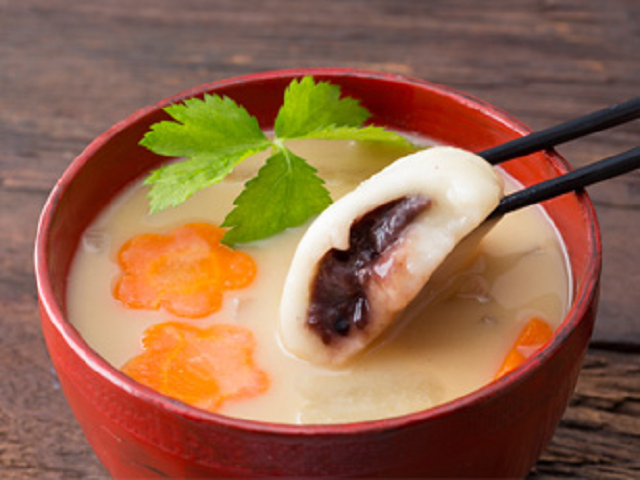
Nearly a dozen Tokyoites rushed to hospital before dinnertime on New Year’s Day.
Along with watching the first sunrise and going out to buy lucky bags, eating mochi rice cakes, especially the super-stretchy kind called ozoni, is a New Year’s tradition in Japan. The custom came about because the way ozoni stretches to amazing lengths is thought to be a metaphor for long life, and so what could be a more auspicious meal to ensure a healthy and happy year to come?
▼ This ozoni is filled with sweet beans, but most varieties are solid mochi.
お馴染みの雑煮です。
— 蓮井佑麻 (@hsi1213) January 1, 2019
激烈お勧めの一品です。 pic.twitter.com/AITiBE7gla
Folk wisdom doesn’t always have the strongest factual foundation, however. While mochi is indeed a relatively healthy food, ozoni has the terrifying capability to bring your life to an abrupt end. Because ozoni’s texture is so soft, and also because it’s usually served in a hot broth, people often try to slurp or swallow it in large pieces, which can then get lodged in the windpipe and lead to choking and suffocation. Ozoni is an especially risky dish for seniors and small children, who may lack the healthy teeth or strong jaw muscles to thoroughly chew their ozoni.
In what’s become a sad but inevitable part of New Year’s in Japan, the Tokyo Fire Department has reported that by 4 p.m. on January 1, 10 Tokyoites had been taken to the hospital after choking on their New Year’s mochi. The victims ranged in age from 27 to 98, with seven who were 60 or older.
Tragically, while medical staff were able to save nine of the victims, an 80-something man from west Tokyo’s Akishima City, who began choking on his breakfast ozoni shortly after 10 a.m., died after reaching the hospital.
The Tokyo Fire Department urges those who insist on eating ozoni to cut it into small pieces, and to chew well before attempting to swallow. Those dining with elderly or young relatives are encouraged to remind them of the danger and the need to be careful, in an attempt to combat youthful inattentiveness of advanced-age stubbornness.
Source: NHK News Web via Otakomu
Top image: Wikipedia/本物を求めるグルメ職人

 Japan’ deadliest New Year’s food may be even more dangerous in 2021 due to the coronavirus
Japan’ deadliest New Year’s food may be even more dangerous in 2021 due to the coronavirus Mochi continues to be Japan’s deadliest New Year’s food, causes two deaths in Tokyo on January 1
Mochi continues to be Japan’s deadliest New Year’s food, causes two deaths in Tokyo on January 1 Survey says osechi New Year’s food differs according to each region in Japan
Survey says osechi New Year’s food differs according to each region in Japan Mochi, the silent New Year killer, leaves nine dead and 128 hospitalized
Mochi, the silent New Year killer, leaves nine dead and 128 hospitalized We try Japanese liquid nitrogen Kit Kats at the new Below Freezing Chocolatory in Tokyo
We try Japanese liquid nitrogen Kit Kats at the new Below Freezing Chocolatory in Tokyo McDonald’s new Happy Meals offer up cute and practical Sanrio lifestyle goods
McDonald’s new Happy Meals offer up cute and practical Sanrio lifestyle goods More foreign tourists than ever before in history visited Japan last month
More foreign tourists than ever before in history visited Japan last month All-you-can-drink Starbucks and amazing views part of Tokyo’s new 170 meter-high sky lounge
All-you-can-drink Starbucks and amazing views part of Tokyo’s new 170 meter-high sky lounge Beautiful Sailor Moon manhole cover coasters being given out for free by Tokyo tourist center
Beautiful Sailor Moon manhole cover coasters being given out for free by Tokyo tourist center Arrest proves a common Japanese saying about apologies and police
Arrest proves a common Japanese saying about apologies and police The oldest tunnel in Japan is believed to be haunted, and strange things happen when we go there
The oldest tunnel in Japan is believed to be haunted, and strange things happen when we go there Our reporter takes her 71-year-old mother to a visual kei concert for the first time
Our reporter takes her 71-year-old mother to a visual kei concert for the first time Foreign English teachers in Japan pick their favorite Japanese-language phrases【Survey】
Foreign English teachers in Japan pick their favorite Japanese-language phrases【Survey】 11 different ways to say “father” in Japanese
11 different ways to say “father” in Japanese Is the new Shinkansen Train Desk ticket worth it?
Is the new Shinkansen Train Desk ticket worth it? Disney princesses get official manga makeovers for Manga Princess Cafe opening in Tokyo
Disney princesses get official manga makeovers for Manga Princess Cafe opening in Tokyo We try out “Chan Ramen”, an underground type of ramen popular in the ramen community
We try out “Chan Ramen”, an underground type of ramen popular in the ramen community Starbucks reopens at Shibuya Scramble Crossing with new look and design concept
Starbucks reopens at Shibuya Scramble Crossing with new look and design concept Beautiful new Final Fantasy T-shirt collection on the way from Uniqlo【Photos】
Beautiful new Final Fantasy T-shirt collection on the way from Uniqlo【Photos】 There’s a park inside Japan where you can also see Japan inside the park
There’s a park inside Japan where you can also see Japan inside the park Japanese convenience store packs a whole bento into an onigiri rice ball
Japanese convenience store packs a whole bento into an onigiri rice ball Studio Ghibli releases Kiki’s Delivery Service chocolate cake pouches in Japan
Studio Ghibli releases Kiki’s Delivery Service chocolate cake pouches in Japan Japan’s bone-breaking and record-breaking roller coaster is permanently shutting down
Japan’s bone-breaking and record-breaking roller coaster is permanently shutting down New definition of “Japanese whiskey” goes into effect to prevent fakes from fooling overseas buyers
New definition of “Japanese whiskey” goes into effect to prevent fakes from fooling overseas buyers Foreign passenger shoves conductor on one of the last full runs for Japan’s Thunderbird train
Foreign passenger shoves conductor on one of the last full runs for Japan’s Thunderbird train Our Japanese reporter visits Costco in the U.S., finds super American and very Japanese things
Our Japanese reporter visits Costco in the U.S., finds super American and very Japanese things Kyoto bans tourists from geisha alleys in Gion, with fines for those who don’t follow rules
Kyoto bans tourists from geisha alleys in Gion, with fines for those who don’t follow rules Studio Ghibli unveils Mother’s Day gift set that captures the love in My Neighbour Totoro
Studio Ghibli unveils Mother’s Day gift set that captures the love in My Neighbour Totoro Domino’s Japan now sells…pizza ears?
Domino’s Japan now sells…pizza ears? New Japanese KitKat flavour stars Sanrio characters, including Hello Kitty
New Japanese KitKat flavour stars Sanrio characters, including Hello Kitty Sales of Japan’s most convenient train ticket/shopping payment cards suspended indefinitely
Sales of Japan’s most convenient train ticket/shopping payment cards suspended indefinitely Sold-out Studio Ghibli desktop humidifiers are back so Totoro can help you through the dry season
Sold-out Studio Ghibli desktop humidifiers are back so Totoro can help you through the dry season Japanese government to make first change to romanization spelling rules since the 1950s
Japanese government to make first change to romanization spelling rules since the 1950s Ghibli founders Toshio Suzuki and Hayao Miyazaki contribute to Japanese whisky Totoro label design
Ghibli founders Toshio Suzuki and Hayao Miyazaki contribute to Japanese whisky Totoro label design Doraemon found buried at sea as scene from 1993 anime becomes real life【Photos】
Doraemon found buried at sea as scene from 1993 anime becomes real life【Photos】 Tokyo’s most famous Starbucks is closed
Tokyo’s most famous Starbucks is closed One Piece characters’ nationalities revealed, but fans have mixed opinions
One Piece characters’ nationalities revealed, but fans have mixed opinions We asked a Uniqlo employee what four things we should buy and their suggestions didn’t disappoint
We asked a Uniqlo employee what four things we should buy and their suggestions didn’t disappoint Princesses, fruits, and blacksmiths: Study reveals the 30 most unusual family names in Japan
Princesses, fruits, and blacksmiths: Study reveals the 30 most unusual family names in Japan Studio Ghibli’s new desktop Howl’s Moving Castle will take your stationery on an adventure
Studio Ghibli’s new desktop Howl’s Moving Castle will take your stationery on an adventure Enjoy hanami cherry blossom viewing on the Ginza Line Sakura Train in Tokyo
Enjoy hanami cherry blossom viewing on the Ginza Line Sakura Train in Tokyo Famous Japanese actor set to measure busts at bra campaign event in Tokyo
Famous Japanese actor set to measure busts at bra campaign event in Tokyo Enjoy the beauty of sakura cherry blossoms at new onsen hanami event in Tokyo
Enjoy the beauty of sakura cherry blossoms at new onsen hanami event in Tokyo Australian arrested at Narita Airport for graffiti on Japanese train in Tokyo
Australian arrested at Narita Airport for graffiti on Japanese train in Tokyo Japanese TV network makes multiple apologies for reporter chewing gum on air【Video】
Japanese TV network makes multiple apologies for reporter chewing gum on air【Video】 Elegant new bar and club space especially for crossdressers to open in Tokyo
Elegant new bar and club space especially for crossdressers to open in Tokyo All-you-can-drink whisky cocktails for under a buck at seafood restaurant with branches in Tokyo
All-you-can-drink whisky cocktails for under a buck at seafood restaurant with branches in Tokyo This restaurant’s US$0.45 sushi is an amazing way to expand your sushi horizons in Tokyo
This restaurant’s US$0.45 sushi is an amazing way to expand your sushi horizons in Tokyo Learn how to make sushi with a professional Japanese sushi chef in Tokyo
Learn how to make sushi with a professional Japanese sushi chef in Tokyo Our unrefined “potato” reporter gets a haircut by an anime hairstyle expert in Tokyo
Our unrefined “potato” reporter gets a haircut by an anime hairstyle expert in Tokyo Serious accidents from walking while using smartphone up over 50 percent in Tokyo
Serious accidents from walking while using smartphone up over 50 percent in Tokyo Hachiko, Japan’s most loyal dog, finally reunited with owner in heartwarming new statue in Tokyo
Hachiko, Japan’s most loyal dog, finally reunited with owner in heartwarming new statue in Tokyo Love fireworks and ice cream? Häagen-Dazs lets you enjoy both at this Hanabi Bar in Tokyo
Love fireworks and ice cream? Häagen-Dazs lets you enjoy both at this Hanabi Bar in Tokyo Idol singer girl sweat flavor fried chicken goes on sale in Tokyo
Idol singer girl sweat flavor fried chicken goes on sale in Tokyo Studio Ghibli offers special Spirited Away present with Toshio Suzuki exhibition tickets in Tokyo
Studio Ghibli offers special Spirited Away present with Toshio Suzuki exhibition tickets in Tokyo
Leave a Reply